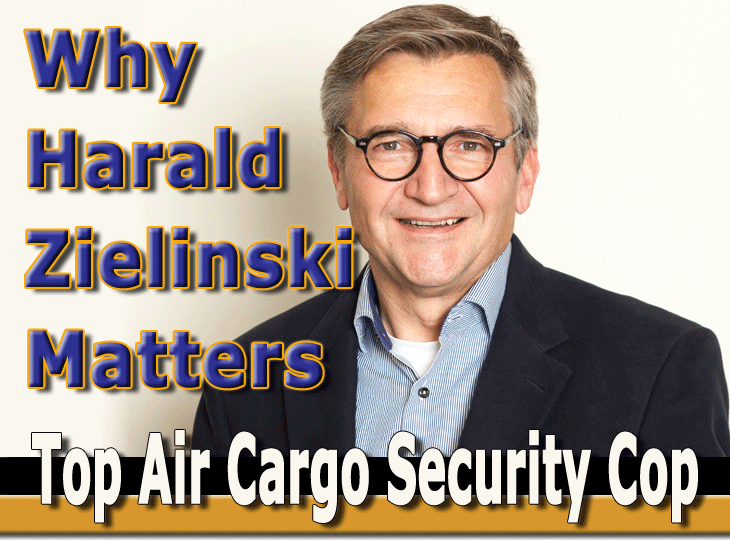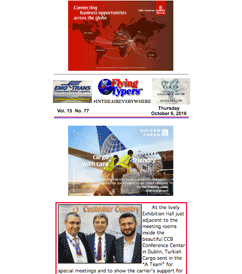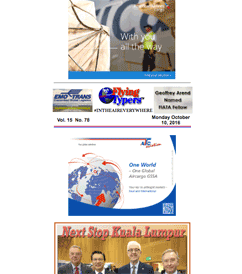 |
No
doubt about it, Christmastide is once again fast approaching. The autumn season marks when the air cargo business exhales
a long, deep breath to take stock of 2016 while planning
ahead for 2017.
While standing and waiting
for a full-body scan recently before a flight and hoping
the prescription pills in my pocket didn’t set off
the damn thing, I started thinking about the people I
know in air cargo who have done a stellar job to raise
cargo security awareness.
These days, as awareness
and heightened security get kicked up a notch with threat
levels from terrorist and copycats always evolving, sharing
thoughts with someone who eats, sleeps, and lives security
is a worthwhile enterprise for anybody in transportation.
One guy who knows the whole
scope of air cargo security and works tirelessly to get
security in line through every phase of the supply chain
is Harald Zielinski, Lufthansa Cargo Head of Security
& Risk Prevention Management.
Harald combines a street
cops’ sensibilities with a visionary view of what
works and doesn’t with security. He said, “What
air cargo must do is continually raise awareness.”
To that end, Harald has
held highly attended, high profile, free admission air
cargo meetings both in Germany and the U.S. for the past
several years.
It’s worth mentioning
that Lufthansa stands alone amongst every other airline
for its continued effort in making the security dialogue
public.
“Moving forward is
a terrific challenge to everybody,” said Harald
Zielinski.
Where
We Are Now
“The ‘Yemen
incident’ in October 2010 had a big impact on air
cargo security,” Harald said.
“It lead to an increase
of security requirements by the EU, especially for non-EU
countries (ACC3 regulation for air carrier transporting
cargo/mail into the EU).
“The results of this
regulation for the industry are additional costs for validation
of the ACC3 airports/stations.
“Additionally another
current topic for air (cargo) security is ‘Cyber
Crime,’ which gains importance.
“On the upside, an
agreement of mutual recognition concerning the security
regimes between EU and the U.S. has been achieved.
“Redundancies of
additional/second screening of cargo/mail at last point
of departure into the U.S. have been accomplished,”
Harald Zielinski said.
Security
At Lufthansa Cargo
“Lufthansa Cargo is constantly working on being
a benchmark for the industry concerning aviation security.
“Therefore, it
is crucial to stay ahead of possible threats and enforce
actions before incidents occur.
“To achieve this
goal, the Lufthansa Cargo Security Department is in
constant discussion with authorities and associations
worldwide.
“In terms of priorities,
of upmost importance are harmonizing and defining standards
for cargo screening technology worldwide.
“On an industry-wide
basis, investment should flow toward projects that are
orientated to this goal.
“My belief is that
harmonizing and defining goals gets the highest necessary
level, as there is still plenty of room for improvement.
“Lufthansa Cargo
supports IATA’s approach toward the implementation
of ‘eCSD’ (electronic consignment security
declaration).
“The initiative
aims toward a global harmonization on the transfer of
security relevant data between entities that are part
of the worldwide cargo network.
“Another topic
that is in progress by the customs authorities and is
fully supported by Lufthansa Cargo is cargo-data transfer
between EU and the U.S. (Pre-Loading Advice Cargo Information,
PLACI).
“Here in Germany
we are constantly updating our security setup and implementing
new technologies.
“The nature of
the threat has not changed, only heightened, during
the past few years.
“Therefore security
remains a key aspect for success as a cargo airline.
Security & Third Party Handling
“Lufthansa Cargo has the same high standards when
it comes to security toward third parties as it has
for itself.
“To ensure that
third parties implement equal security standards, different
measures have been implemented by LCAG, as an integral
element of our ‘Quality Assurance Management System.’
“QAMS is comprised
of cargo security manuals, auditing, and also includes
on-site inspections.
“Most recently,
Lufthansa Cargo is proud to say that it launched (in
addition to our mandated general measures) a ‘Security
Data Management System.’
“SDMS includes
a database with details on every station/warehouse worldwide
where Lufthansa Cargo handles freight.
“The system is
updated constantly to insure that every station fulfills
the high security standards determined by Lufthansa
Cargo.”
Security Conference Ahead
Harald left unanswered
when another of Lufthansa Cargo’s aforementioned
unique and highly acclaimed one-day security conferences
will take place in Germany.
At the time of this writing,
the date and location are yet to be determined
Harald said: “The
agenda is purposely kept flexible so that our gatherings
are addressing major issues confronting the industry
in real time.
“[There is] no
creating an agenda months in advance—we are security
experts in the here and now, gathered to discuss and
deconstruct security challenges for the purposes of
looking for solutions to hot button issues at hand.
“There have been
seven security conferences until now.
“The first conference
was in 2006. And I am already looking forward to the
next.
“As mentioned at
the top, topics are of general interest in the industry
at that time.
“The last security
conference, for example, dealt with the threat for air
cargo by international terrorism and Cyber Crime.
Priorities In Cargo Security
With the giant Lufthansa
Cargo center in Frankfurt and every other cargo station
the carrier either operates or is associated with under
the watchful eye of “One Tough Cop,” as
Harald Zielinski has been described, we wonder about
priorities.
As it turns out, Harald
has thought about that as well.
“Air cargo cannot
rest. When it comes to security, Lufthansa Cargo makes
no compromises. Rather, we constantly anticipate new
threads and countermeasures.
“The industry needs
an immediate and long range plan toward further improvement
of screening technology.
“[Such as] avoiding
different security standards within the EU (since there
are still differences between EU member states when
it comes to implementing EU regulation concerning aviation
security).
“There needs to
be worldwide harmonization of security standards (according
ICAO Annex 17) in more detail, since ICAO Annex 17 is
too broad to harmonize the day-to-day cargo security
business.”
An Appeal
“Nations must develop
air cargo security standards and implement new laws
and regulations,” Harald Zielinski said.
“But to get things
right and actually enhance aviation security, it is
necessary to know how the air cargo industry works.
“Unfortunately,
authorities worldwide still have a lack of general understanding
of ‘air cargo security’ (versus aviation
security for passengers).
“Therefore, I must
repeat the call that it is incumbent on the air cargo
industry to better define and align common security
regulations,” Harald Zielinski said.
Geoffrey |





 Vol.
15 No. 78
Vol.
15 No. 78